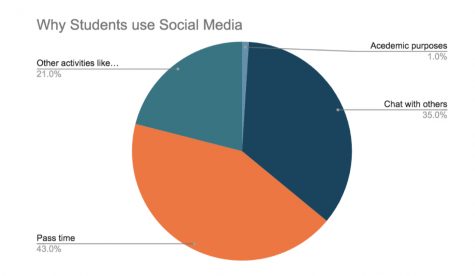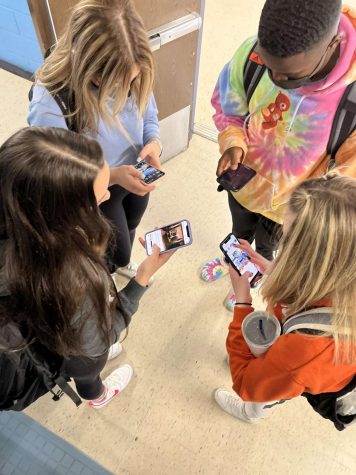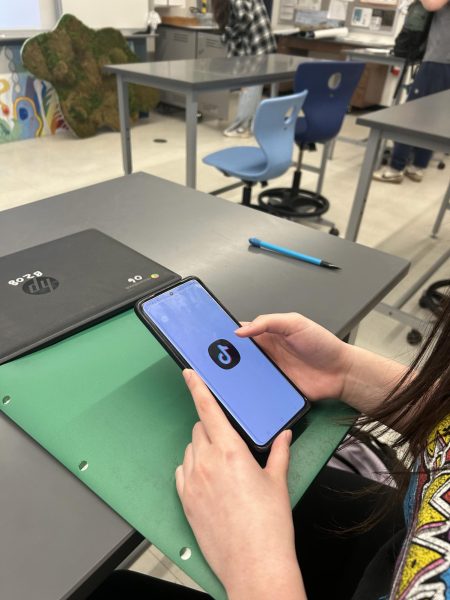Social Media Proves Harmful
Teens in the United States have been negatively affected by social media. Research shows that besides affecting their mental health, platforms like TikTok, Facebook, Instagram, and others are causing students to be distracted at school and have major body image issues.
In recent years, TikTok has become a popular social media juggernaut, particularly with young adults and teens. At the same time, troubling reports have shown that kids on TikTok will do almost anything to get noticed and obtain a platform on the app. Many of these activities include dangerous challenges causing kids to put themselves or others in harm. One example of the challenges going around the internet is the “dry scoop challenge.” This involves taking a scoop of pre-workout powder before exercising. The twist is that, while these powders are meant to be dissolved in water, TikTokers are gulping down spoonfuls of the stuff completely dry. Many who try the challenge end up nearly choking on the powder, coughing up clouds of protein dust. One TikToker, Britanny Portillo, experienced a much more serious reaction. The 22-year-old dancer tried the challenge to energize her workout but ended up in the hospital due to a heart attack. From her hospital bed, she shared updates to her fans and warned them about the dangers of tik tok challenges saying “Putting this out there so y’all don’t do what I did because I’m the type of person to try anything and everything I see here w/o questioning it”.
Not only can social media cause harm to oneself and others, but it can also create a distraction in school. The majority of students nationwide use some form of social networking from day today. Excessive social media use for non-academic purposes distracts students from their learning and academic activities. Senior Romy Cowan says “It [social media] affects me in a bad way in the sense that there is no way to moderate it. Sometimes you can spend hours scrolling through feed. And so when it takes that much of your time, it really can’t be a good thing”. In a study done with 300 students, only 1% of the students used social media for academic purposes. In contrast, 35% of them used social media to chat with others, and 43% of them used it to pass time. When asked “Do you feel more attracted to social media compared to study?” 34% said no while 66% said yes.

Recently, Facebook has said that it has paused the development of an “Instagram Kids” service that was meant to be tailored for children 13 years or younger. This pause is taking place because the social network increasingly faces questions about how the app affects young adults’ mental health. Research shows that the company, Facebook, knows about the harmful effects Instagram was having on teenage girls. While Facebook argues that it was meant for kids 10 to 12 and would require parent permission to join, others argued that it would hook on the app at a younger age rather than protecting them from problems from the service. What are the problems you may ask? Child predatory grooming, bullying, and body shaming just to name a few. Internal research shows that Instagram has caused teenage girls to feel worse about their bodies and led to an increased rate of anxiety and depression. Ap Psychology teacher Dr. Boucher says “they[girls] have really unhealthy understandings of effectively I mean how good they look and what people think about them and they get really attached as they get really attached to those likes.” And further studies only go to confirm this. Researchers in a spring 2020 slide presentation posted to Facebook’s internal message board said that “Thirty-two percent of teen girls said that when they felt bad about their bodies, Instagram made them feel worse”.

Social Media has affected a lot of students in their teen years specifically while in high school because there are so many changes that happen to an individual in high school. As discussed in the article “Facebook Comes Under Fire After Whistleblower and Leaked Documents reveal negative impacts on Girls’ ‘ by Becky Upham she talks about how there is a social norm created by society about how women should look, dress, and act. False advertisements happen a lot on social media causing kids to buy items to make them feel like they’re popular in today’s society by just keeping up with what all the celebrities are wearing. As the article states “Repeated exposure to carefully crafted and controlled images of their peers that do not reflect reality can have detrimental effects on young persons who are engaged in social comparison,” this gave us the most general view about how social media affects teen girls since social media only shows the “shine” of others instead of showing them how they look outside of social media especially celebrities that use advertisements to make teens buy what they have to make them feel like they’re something in society.
Studies show that there is a connection between social media use and depression. In the article, “Does Social Media Use Cause Depression?” Caroline Miller discusses that talking with other people online is less emotionally fulfilling than talking in person. Studies show that human beings need face-to-face interaction in order to be mentally healthy. The more you use social media, the less face-to-face interaction you have, contributing to the mood disorders and depression we see so often in today’s world. Also, social media can hurt people’s self-esteem by seeing perfect pictures portrayed online. The article states, “Social media can also cut into the time that kids spend on activities that make them feel good, like exercise and hobbies.” This can lead to an overall decrease in mental health by not doing the things you enjoy.
Not only can social media be a huge cause of depression and anxiety, but also has a big impact on FOMO(fear of missing out). While FOMO has been around longer than social media has, such social media like Facebook, Instagram, or Snapchat seem to exacerbate feelings that others are having more fun or living a better life than you are. Much of this, though, is fake. Junior Sydney Goldsmith says “I like that social media is entertaining when I have nothing to do. But I also don’t really like it because it can give people a fake reality of people’s lives because you don’t know what actually goes on behind the screen.” The idea that you are missing out on such things can trigger, anxiety, low self-esteem, and even trigger greater social media use. FOMO can cause you to pick up your phone every few minutes to check for updates. This excessive social media use causes people to get distracted while driving, get less sleep, and even start to impact their real-world relationships as they start to live their life through their phones.





